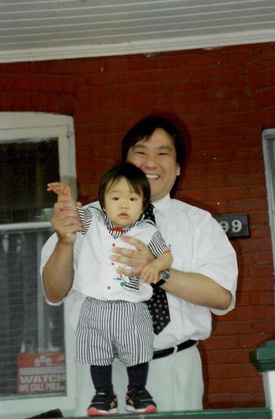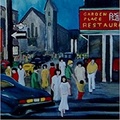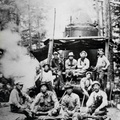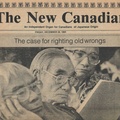As I watched the circus of race and denigration that is the White House, Congress, and American society in July, I tried to remember how some Democrats are at times politically expedient and opportunistic and how most Republicans are hypocritical and cowardly. Why can’t right-wing politicians just call the man in the White House a racist? Either they are racists themselves or maybe it takes decades. I mean, Woodrow Wilson is only recently being identified as a racist. In any case, present-day Washington has put me in mind of an incident during my youth, when I was in my early twenties.

I was an angry young man. My anger was probably fuelled by the Asian American and Canadian Activist Movements. “Out of Vietnam now! Brothers cannot kill brothers!” “Don’t call me ‘Oriental’, I’ve been stepped on long enough!” “We are the sons and daughters of the Japanese gardener.” In any case, during “rap” sessions I had with other Asian Canadians, I came to realize just how racist Canada was.
There were plenty of incidents in my childhood. Being called a “chink”, a “Jap”, a “gook” was nothing compared to the fights and beatings I took in schoolyards and back alleys. Like most I’ve talked to, whenever I was verbally assaulted directly and blatantly, I was shocked and was paralyzed. I was also told several times, “Go back to where you came from!” My mind reeled with confusion. They’re wrong, I thought, I’m a Canadian. I was born here. There was no need to call me all those names, no need to tell me to leave the country. I could not believe that I was the subject of such racism.
How did I react? I did fight back when confronted with physical violence, but only to defend myself. But when catcalled, I was overwhelmed with a sense of shame and skulked away, hanging my head, not wishing to be seen. I was ashamed of who I was and how I looked.
At some point, I decided enough was enough. I trained myself to respond physically or verbally. I swore my head off. I punched, I kicked, I even got into a glass-fight once. I became the angry young man.
One regrettable incident happened one autumn day. I was waiting for a bus at the top of my street in the east end of Toronto. I was probably going to school. An elderly white lady, a stranger, approached me. She was wizened in appearance, the skin on her face sagged and was patterned with wrinkles. Her hair was thinly white. She did not walk comfortably.
She rushed up as best as she could to stand right in front of me and started to swear at me, while calling me all those familiar racist names. I was a “yellow, slant-eyed bastard”, a chink that didn’t belong here. She told me in no uncertain terms to “go back to where you came from.” This was totally unprovoked. Why she chose to accost me was anyone’s guess. It was not like I harassed her to begin with or hurled epithets at her. Neither did I randomly trip her or attack her violently in any way. No, she saw me and decided I represented a group of miscreants whom she hated.
My reaction was swift. I told her to “back off” and to stop. But she didn’t. She kept at me, continuing her vicious racist diatribe. I could feel the anger in me rise like a flood. My face felt flushed and burned like hot coals. I stooped slightly to face her and spit.
She immediately stopped. She was horrified, perhaps terrified, certainly upset that someone of my “kind” would stand up to her. She covered her face to wipe it clean, and then turned around and ran away. Ran as best as she could. I remained, fuming with rage; I was enraged that she had dragged me down to her level. I felt no satisfaction in what I did. I also felt the old familiar shame I did as a kid. I went back home where I came from and missed school that day.
I am not proud of what I did. It was probably the foulest thing I could’ve done, probably the foulest I’ve ever done. Was there another way? I could see I had offended her with my very presence (not that I could’ve done anything about that), but there was no call for her to attack me as she had. I on the other hand had possibly overreacted. And for no real purpose. I doubt that she learned anything from my act of defiance. She most likely attacked someone else just as vehemently, with as much prejudice as she could muster.
Which brings me back to Washington. The “Squad”, Ilhan Omar, Ayanna Pressley, Rashida Tlaib, Alexandria Ocasio-Cortez, reacted in a much more civilized way to the White House resident’s racist sentiments. They called him a racist or a fascist straight to camera, and the mainstream news media consistently called the man’s comments racist. But he persisted. And the Squad’s answers to him were measured but firm. They did not avoid, obfuscate or lash out irrationally, as some politicians do, when asked point-blank what they thought. Their tormentor is a man with Klass with a capital “KKK”. They are class personified.
They as well as I know that we are exactly where we should be – in America in their case and Canada mine. Right where we belong.
Editor’s note: Discover Nikkei is an archive of stories representing different communities, voices, and perspectives. This article presents the opinions of the author and does not necessarily reflect the views of Discover Nikkei and the Japanese American National Museum. Discover Nikkei publishes these stories as a way to share different perspectives expressed within the community.
© 2019 Terry Watada





